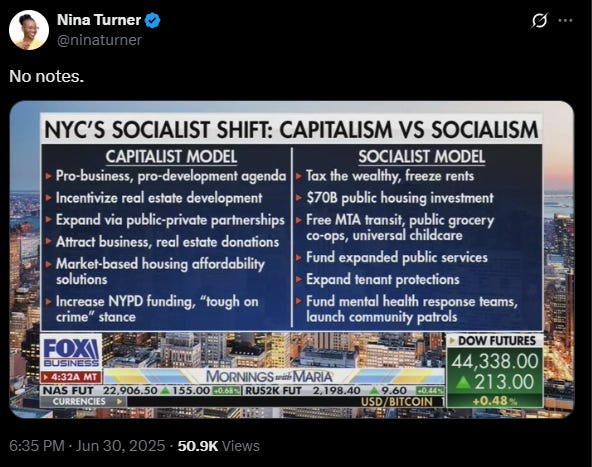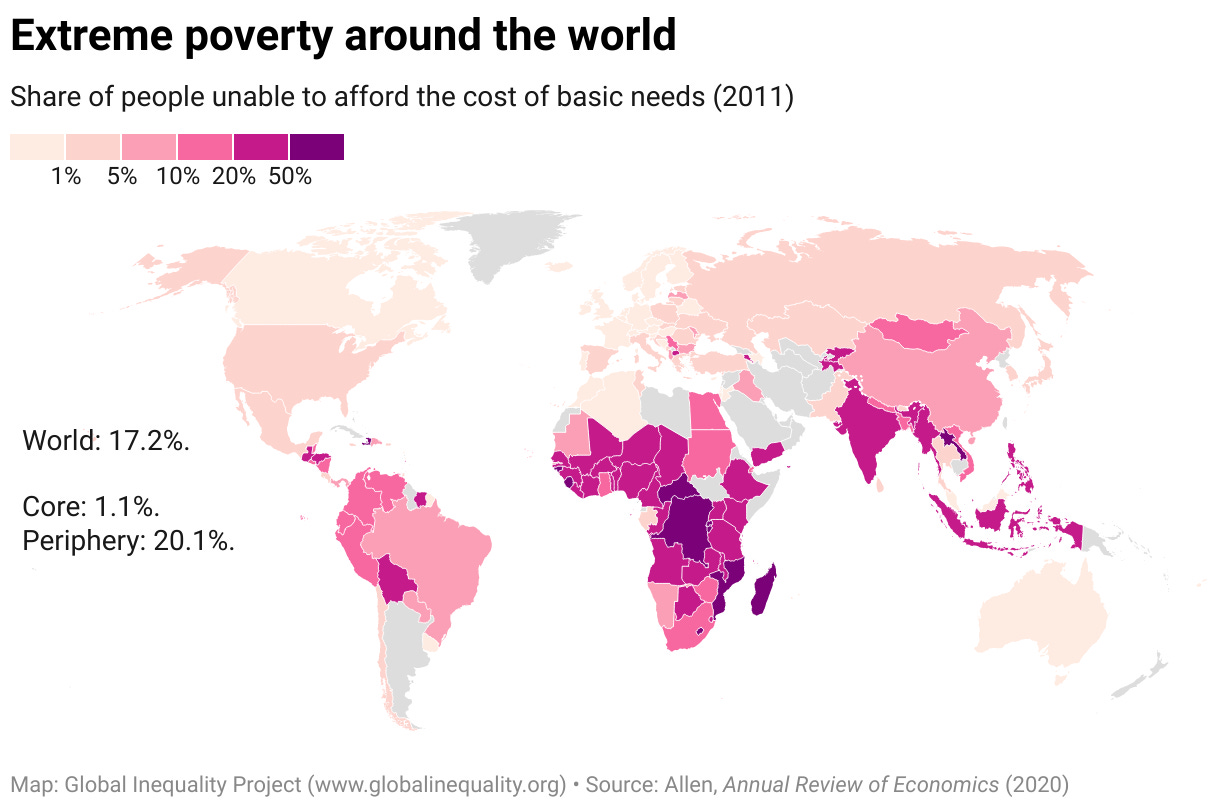Zohran Mamdani Socialist Mayor of New York: Is this the End of Capitalism?!
Democratic socialist Zohran Mamdani is very likely going to be the next mayor of New York City. Of course, this is not going to end capitalism right away. But the super rich are panicking about Mamdani because they know that genuine socialist policies can carve a big chunk into their wealth and power. At the same time, Fox News posts this graphic that is supposed to ridicule socialism, but makes a very strong case for socialism, because everything listed in this comparison is actually correct!
Fox News also posted this interview with Laura Gillen, a Democrat from New York, which she describes as “the global epicentre of capitalism”. If an immigrant, Muslim, socialist becomes the mayor of New York City and implements everything he promised, it means the stronghold of capitalism is not as strong as we imagined.
In the English-speaking world, and in the former Communist countries, such as my country of birth Romania, criticizing capitalism and advocating for socialism raises very strong emotions. The words “capitalism” and “socialism” are extremely loaded. Many people in these countries associate capitalism with democracy, freedom and prosperity and associate socialism with authoritarianism, state oppression and poverty. Of course, if we cherry-pick certain aspects from both present-day capitalism and historical socialism, these statements may appear true, if we are superficial in our thinking.
But cherry-picking is such a dangerous game. Not only it misrepresents reality, but it leaves out the truth, which is usually more complicated than a few quick statements. If we look at the responsibility for climate breakdown the Global North, which is comprised of capitalist countries, we see that it is responsible for 86% for global CO2 emissions, while the rest of the world, including Communist China, are responsible for 13%.
The massive upsurge in emissions and climate degradation happened after the fall of the Soviet Union in 1991, so we cannot blame socialism for that.
Top countries that have exceeded their fair share of the carbon budget for the planetary boundary of 350ppm are all capitalist, as we commonly understand capitalism.
China, that has a mixed communist-capitalist system, has exceed her share by 6% considering its population, and not 1000% as did the capitalist United States.
At the same time, to highlight the paradox, India, who is also a capitalist country on its whole, is a climate creditor because she has used only 38% of her fair budget of CO2 emissions, considering her population.
These paradoxes and massive imbalances happen because of two reasons. Reason one: the rate of capital accumulation grows faster than the rate of growth of human needs, as I have shown in the c>n formula. Reason two: this growth happens at very different rates around the world, with a lot of capital accumulation happening much faster in rich countries, because this capital is largely stolen from the poor countries.
Can we phase out this unjust system? The end of capitalism can begin with socialists winning elections here and there. The more shocking and unexpected, the better. However, if politicians like Zohran Mamdani are successful at implementing all their agenda, this would only scratch the surface of the problem. The true end of capitalism will begin when socialists and other anti-capitalists will understand the entire big picture.
Normally we would see definitions of capitalism that go like this:
Capitalism is a mode of economic organization that seeks to maximize returns to the owners of wealth, with its core operating system based on private property, wage labour and the market mechanism. (Roman Krznaric)
Capitalism is an economic system based on private property and markets, that depends on many people having nothing to sell but their labor and, above all, it prioritizes delivering profit for the owners of wealth. (Kate Raworth)
[...]capitalism is more than an “economic” system, and even more than a social system. Capitalism is a way of organizing nature. (Jason W. Moore)
I think these definitions are too imprecise and vague. They do not touch the causal forces within capitalism. They only describe symptoms of capitalism. They are also not quite correct because all markets are regulated to some extent, private ownership of the means of production is also regulated, for example not everyone can start their private weapons factory, and the state plays a huge role in developing new technologies and so on.
I characterize capitalism as the economic system where the realms of property, power, and capital are linked together by three fundamental causal vectors: (1) the doctrine of proportionality which links power to property, (2) the doctrine of dispossession which links property to capital, and (3) the doctrine of hierarchies links capital to power. Instances of proportionality can be seen in how corporate law establishes the principles of one share = one vote in opposition to one human = one vote, or how wealth creates political power in proportion to its size. Instances of dispossession can be seen in the appropriation of indigenous land (also known as dispossession without consent), or the appropriation of personal data by Big Tech for the purpose of advertising for profit and behaviour modification (also known as dispossession with passive consent). Instances of hierarchies can be seen in how management positions in corporations are unelected, how power trickles down and never “trickles-up”, or how allocation of capital is strictly a function of unelected hierarchies.
What does this definition mean for the end of capitalism? If we abolished the stock markets and if we completely disconnected wealth from politics, we would phase out the doctrine of proportionality. If we abolished modern-day colonialism, meaning ending the plunder of resources of poor countries and indigenous territories, and cancelling the debt of the Global South, we would phase out the doctrine of dispossession. If we abolished unelected hierarchies at the workplace and replaced them with full economic democracy on the principle of one human = one vote, we would effectively phase out the doctrine of hierarchies.
A socialist agenda like Zohran Mamdani is great if it is successful and if it goes far enough. For example he proposes to raise the corporate tax at 11.5% and tax New Yorkers who earn more than $1 million dollars annually at 2% flat tax. This may appear radical because we are talking about New York, the global epicentre of capitalism. But, if we zoom out of New York, we see that it is a moderate policy, when we realize that, for example, 75% of the people in the Democratic Republic of Congo cannot afford the cost of basic needs. Remember, Congo supplies a lot of the cobalt for the gadgets used by people in the rich countries, including both rich and poor New Yorkers. There is always a connection between the lifestyles in rich countries and those in poor countries.
Socialists in the rich countries would have to continue the fight of the people like Zohran Mamdani by aiming at the privileges of the rich elite. While doing that, they must also keep in mind the big picture. It is not enough to take away power and wealth from the rich, if colonialism is kept in place. It is not enough to increase the wellbeing of everyone, if that means breaching ecological limits, and keeping massive inequalities in the world.
One thing is certain. Capitalism, as I defined it, has ran its course because it broke the planet. It used more than what Earth can sustain. It is gong to collapse sooner or later. Whether we are socialists or not, we know that we desperately need a new economic system in which resources, wealth, and power are distributed much more equally and fairly.








